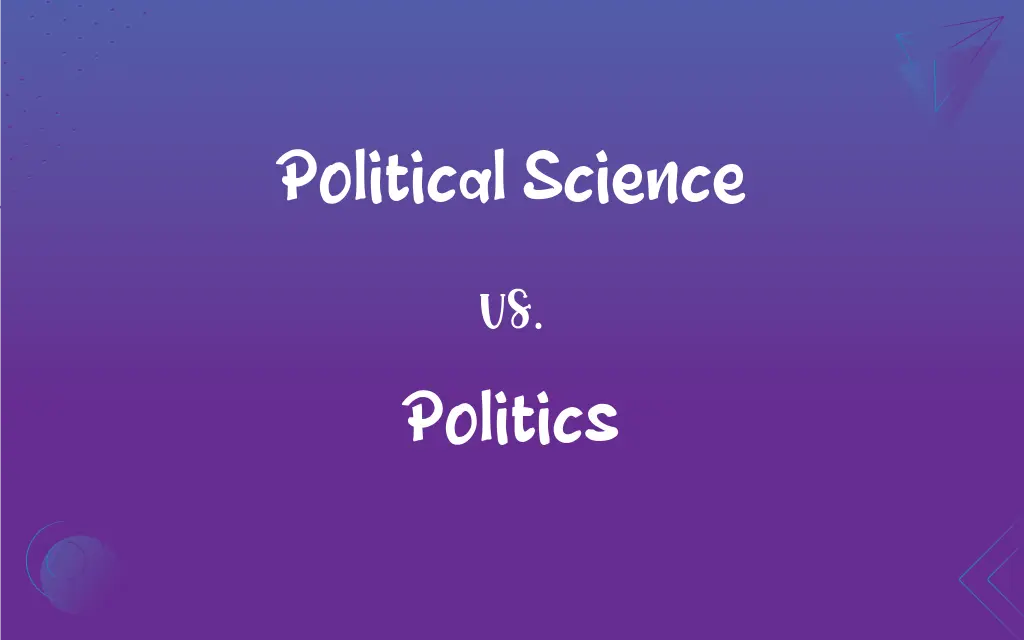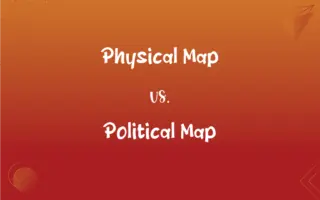Political Science vs. Politics: What's the Difference?
Edited by Aimie Carlson || By Harlon Moss || Updated on October 6, 2023
Political science is the academic study of government and political systems, while politics refers to the activities, actions, and policies used to gain and hold power in government.

Key Differences
Political science stands as an academic discipline that seeks to analyze, understand, and often theorize about the structures, functions, and dynamics of political systems, governments, and political behavior. It involves exploring various theoretical frameworks and conducting research to understand political phenomena. Political science digs deep into the principles and theories behind political systems and explores various political ideologies, structures, and governmental functions, often from a non-partisan perspective.
Contrarily, politics typically denotes the practice and application of power and governance, often within the framework of a state or another administrative division. Politics might involve activities that are centered on making decisions that apply to members of a group and generally encompasses making agreements between individuals, forming parties or groups, and interacting within and between those entities. While political science hones in on understanding and exploring concepts in a structured and academic way, politics tends to be much more action-oriented and practical.
Political science is fundamentally concerned with understanding and exploring concepts in a structured, empirical, and often academic manner. It endeavors to understand how political systems operate, how political decisions are made, and how political phenomena impact society and individuals. While political science does indeed intersect with politics in various ways, it remains primarily an academic and research-oriented field, often involving a level of abstraction and theoretical analysis.
On the other hand, politics, in its daily manifestations, often involves real-world applications and practices, encompassing everything from political campaigning, governance, policy-making, and international relations. Politics inherently involves the struggle for power and the implementation of policies and is thus embedded in the practical realms of decision-making, leadership, and governance. It is largely pragmatic and is primarily concerned with what is rather than what should be or what could be, as political science often explores.
Interestingly, political science often informs politics, providing theories, insights, and data that can help to shape political strategies, policies, and understandings. Politics, in turn, provides a real-world arena where theories and concepts derived from political science can be observed, tested, and analyzed. So, while political science and politics are distinctly separate in terms of their nature and primary concerns, they are intrinsically linked and perpetually interplay in various significant ways.
ADVERTISEMENT
Comparison Chart
Definition
Academic study of political systems and behavior
Activities related to gaining and exercising power
Focus
Theoretical frameworks and empirical research
Practical application and execution of power
Nature
Analytical and academic
Action-oriented and practical
Primary Concern
Understanding and explaining political phenomena
Engaging in and navigating power dynamics
Application
Informs political practice through theories and data
Involves real-world governance and power struggles
ADVERTISEMENT
Political Science and Politics Definitions
Political Science
Political science is the scholarly study of government systems, political activities, and political entities.
The student decided to major in political science to understand the underlying principles behind governmental systems.
Politics
Politics pertains to the practices or professions associated with governance and political activities.
The young activist was determined to change the landscape of local politics with her community-driven approach.
Political Science
Political science encompasses studies of political theories, comparative politics, international relations, and public administration.
His degree in political science offered a comprehensive view of both local and international political dynamics.
Politics
Politics involves the activities and affairs involved in managing a state or government.
His career in politics was characterized by strategic alliances and a keen understanding of public sentiment.
Political Science
Political science involves analyzing the theory and practice of politics, including policy analysis and public administration.
Political science scholars often delve into policy analysis to understand the implications of governmental decisions.
Politics
Politics embodies the theory and practice of navigating power and governance, including within organizations.
Office politics can significantly impact the working environment and employee morale within an organization.
Political Science
Political science seeks to explore the systematic structure and functioning of political institutions and behavior.
Through studying political science, she gained insight into the complex workings of various political institutions.
Politics
Politics refers to the art or science concerning the guiding or influencing of governmental policy.
The mayor understood that politics often required strategic compromises to achieve broader goals.
Political Science
Political science aims to understand, explain, and sometimes predict how politics and government affect and are affected by individuals and groups.
Political science researchers were intrigued by the impact of social media on electoral outcomes.
Politics
Politics encompasses the actions, strategies, and principles aimed at gaining and exercising power within a governance structure.
The politician navigated through the intricate politics of her party to push forward her policy initiatives.
Politics
The art or science of government or governing, especially the governing of a political entity, such as a nation, and the administration and control of its internal and external affairs.
Politics
Political science.
Politics
The activities or affairs engaged in by a government, politician, or political party
"Our politics has been corrupted by money and suffused with meanness" (Peter Edelman). "Politics have appealed to me since I was at Oxford because they are exciting morning, noon, and night" (Jeffrey Archer).
FAQs
Is political science always impartial?
While political science aims to be impartial and objective, researchers may have biases that influence their perspectives and studies.
Can political science influence politics?
Yes, political science can influence politics by providing data, theories, and insights that inform policy and strategy.
How is ethics related to politics?
Ethics in politics relates to moral principles guiding political behavior, policy-making, and governance.
Are international relations a part of political science?
Yes, international relations study how countries interact with each other, a key subfield of political science.
What is the core focus of political science?
Political science focuses on analyzing, understanding, and theorizing about government structures and political behavior.
Can politics be studied scientifically?
Yes, the scientific study of politics falls under political science, which uses methodologies to understand political phenomena.
How does comparative politics function within political science?
Comparative politics, a subfield of political science, involves comparing political systems, processes, and outcomes across different countries.
How does public opinion influence politics?
Public opinion influences politics by affecting electoral outcomes, policy-making, and the popularity of political entities.
What methodologies are used in political science research?
Political science research may use methodologies like qualitative analysis, quantitative data analysis, case studies, and comparative research.
Can political science predict political events?
While political science uses theories and data to understand trends, predicting specific political events can be challenging due to the complexity of variables involved.
Is politics only related to government?
No, politics can also refer to power dynamics and governance within any organization or group.
Can anyone engage in politics?
Yes, anyone can engage in politics through various means such as voting, activism, or running for office.
How does politics differ from political science?
Politics involves practical governance and power dynamics, while political science is the academic study of political systems and behavior.
How does political theory fit into political science?
Political theory, a subfield of political science, involves developing and analyzing theories about political systems, behavior, and values.
What is practical politics?
Practical politics involves engaging in political activities, strategies, and actions that influence governance and power structures.
What are the career paths in political science?
Career paths in political science include academia, policy analysis, research, journalism, and various roles in government.
How does politics affect everyday life?
Politics affects everyday life by shaping laws, policies, and services that influence societal structures and individual circumstances.
How are laws related to politics?
Laws are related to politics as legislative processes, policy-making, and legal enforcement are inherently political actions and systems.
What does political science say about democracy?
Political science explores the principles, implementation, and outcomes of democracy, analyzing its strengths and weaknesses.
How does one become a politician?
Becoming a politician typically involves engaging in politics, often through party participation, activism, or serving in governmental roles.
About Author
Written by
Harlon MossHarlon is a seasoned quality moderator and accomplished content writer for Difference Wiki. An alumnus of the prestigious University of California, he earned his degree in Computer Science. Leveraging his academic background, Harlon brings a meticulous and informed perspective to his work, ensuring content accuracy and excellence.
Edited by
Aimie CarlsonAimie Carlson, holding a master's degree in English literature, is a fervent English language enthusiast. She lends her writing talents to Difference Wiki, a prominent website that specializes in comparisons, offering readers insightful analyses that both captivate and inform.































































